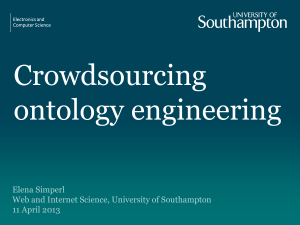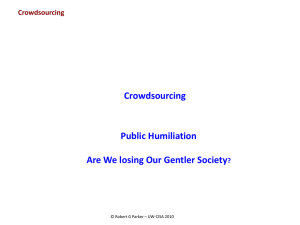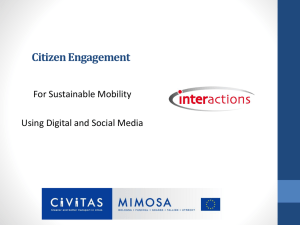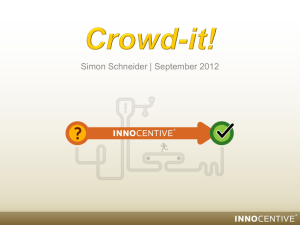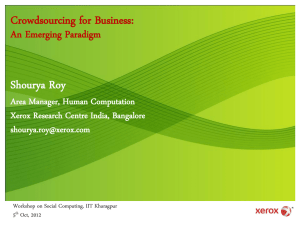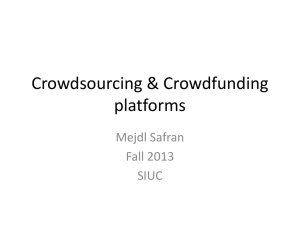What is Crowdsourcing? - Rensselaer Hartford Campus
advertisement
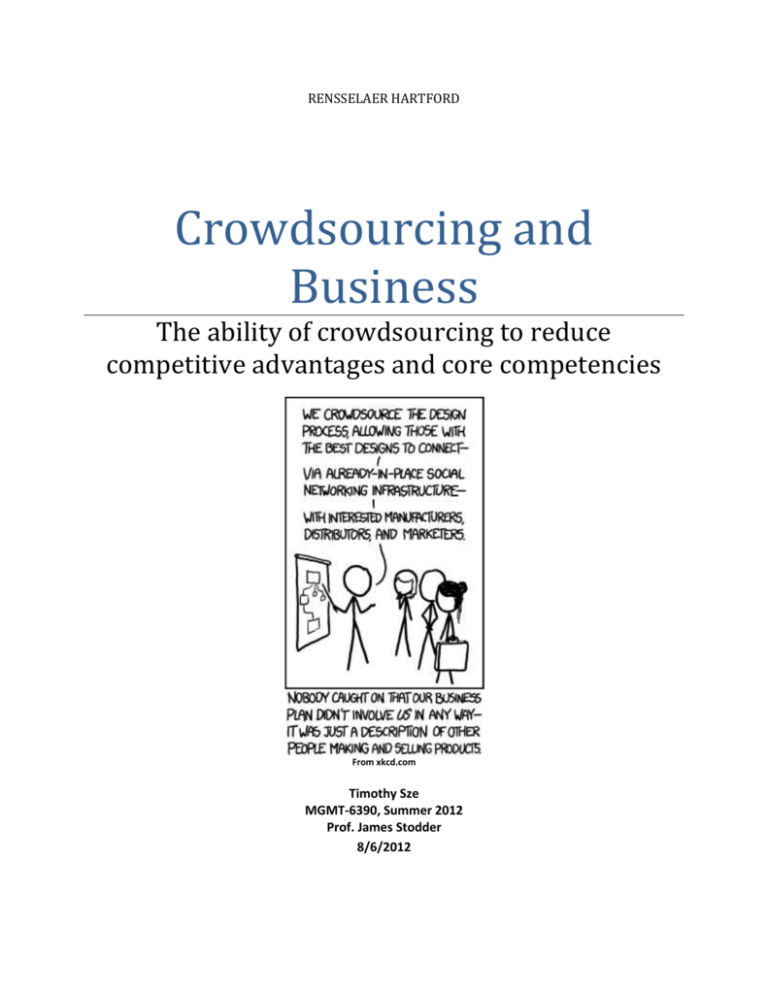
RENSSELAER HARTFORD Crowdsourcing and Business The ability of crowdsourcing to reduce competitive advantages and core competencies From xkcd.com Timothy Sze MGMT-6390, Summer 2012 Prof. James Stodder 8/6/2012 Crowdsourcing Thesis Contents Thesis ............................................................................................................................................................ 3 Abstract ......................................................................................................................................................... 3 What is Crowdsourcing? ............................................................................................................................... 4 Reduced Competitive Advantage ................................................................................................................. 4 Open Collaboration ................................................................................................................................... 5 Quality Control .......................................................................................................................................... 5 Distributed Knowledge ............................................................................................................................. 5 Reduced Core Competencies ........................................................................................................................ 6 Project Control .......................................................................................................................................... 6 Loss of Knowledge .................................................................................................................................... 7 Counter Arguments....................................................................................................................................... 7 Wisdom of the Crowd ............................................................................................................................... 7 Focus on Core Competency ...................................................................................................................... 8 Reduced Costs Provides Higher Competitive Advantage ......................................................................... 8 Conclusion ..................................................................................................................................................... 9 Works Cited ................................................................................................................................................. 12 8/6/2012 2 Tim Sze – International Operations Crowdsourcing Thesis Thesis Crowdsourcing reduces the competitive advantage and core competencies of a firm. Abstract As a relatively new term, coined in 2006 by Jeff Howe, the definition of crowdsourcing is subjective and is still debated among industry analysts. Howe’s definition is “the act of taking a job traditionally performed by a designated agent (usually an employee) and outsourcing it to an undefined, generally large group of people in the form of an open call.” (Howe, 2006). Atitscore, it can be defined as “the practice of obtaining needed services, ideas, or content by soliciting contributions from a large group of people and especially from the online community rather than from traditional employees or suppliers,” per Merriam Webster. Crowdsourcing can be divided into different categories including microworks, prizes and contests, implicit crowdsourcing, crowdfunding, wisdom of the crowds, and crowdsourcing of creative works. As crowdsourcing grows in popularity, businesses need to be aware of the risks that are associated with its use. The risks of crowdsourcing include the reduction in competitive advantage and core competencies of the business. Crowdsourcing poses significant challenges to the long term competitive advantage of a company. Knowledge is shifted from internal sources to unknown external sources and that knowledge is not retained unlike in a cluster where the gain in knowledge is shared with those in the area. Open collaboration reduces the companies’ ability to develop competitive strategies which can make long term success difficult to achieve. Failures in quality controls are setbacks for companies trying to compete in the market. Crowdsourcing reduces core competencies by removing the controls that a business has on its product and service while preventing the company from gaining the knowledge needed to maintain the competencies. As we will cover in this paper, the effects of crowdsourcing may positively affect the short term but, more importantly, negatively affect the company in the long run without proper thought. 8/6/2012 3 Tim Sze – International Operations Crowdsourcing Thesis What is Crowdsourcing? As a relatively new term, coined in 2006 by Jeff Howe, the definition of crowdsourcing is subjective and is still debated among industry analysts. Howe’s definition is “the act of taking a job traditionally performed by a designated agent (usually an employee) and outsourcing it to an undefined, generally large group of people in the form of an open call.” (Howe, 2006). Atits core, it can be defined as “the practice of obtaining needed services, ideas, or content by soliciting contributions from a large group of people and especially from the online community rather than from traditional employees or suppliers,” per Merriam Webster. (Merriam Webster, n.d) In this paper, the term “crowd” will be used to describe any person partaking in providing the “needed services, ideas, or content.” Crowdsourcing can be divided into different categories including microworks, prizes and contests, implicit crowdsourcing, crowdfunding, wisdom of the crowds, and crowdsourcing of creative works. Microworks are jobs that are simple and quick that technology has not been able decipher. Early types of crowdsourcing included the use of prizes and contests. Implicit crowdsourcing is harnessing the crowd to complete tasks where the crowd is not necessarily aware of their contributions. Crowdfunding is the use of the crowd to fund projects that they deem worthy of implementing. “Wisdom of the crowd” projects are projects where the crowd is presented with a complicated challenge and solved as a community. Crowdsourcing of creative works is the request to the online community to design new works of art. (Wikipedia - Crowdsourcing, 2012) The concept of crowdsourcing in the different forms have been around for many centuries as seen in the Longitude Prize in 1714 and the creation of the Oxford dictionary in the past (Esposti (a), Jul 2011), to the modern day use of Amazon Mechanical Turk and reCaptcha. (Lynch, 2010) Needless to say, crowdsourcing is a complex and broad term that can be incorporated into many different industries. As crowdsourcing grows in popularity, businesses need to be aware of the risks that are associated with its’ use. The risks of crowdsourcing include the loss of competitive advantage and the loss of the core competencies of the business. Crowdsourcing does have positive features such as lower costs, large labor pool with a diversified base of knowledge, and allowing for global collaboration. (Alsever, 2007) These positive features do come with their own set of challenges. Reduced Competitive Advantage While crowdsourcing is a broad and general concept that may work for some industries and sub industries, it can be more destructive to the business soliciting for the contributions than an internal group tasked to solve the problem. The use of crowdsourcing can reduce the long term competitive advantage of business. Requests for contributions from the crowd become open to the general population and can provide insight to the competition into future innovations or products in development. Ideas generated by the crowd may be susceptible to fallacies and those that remain unchecked can lead to failure. The distributed knowledge of the crowd reduces the companies’ ability to create a business cluster in the local area to grow and share knowledge amongst suppliers and producers. 8/6/2012 4 Tim Sze – International Operations Crowdsourcing Thesis Open Collaboration Open collaboration on projects can be beneficial for end users and businesses maintaining a product. They are able to reduce costs by essentially testing every aspect of the product to prevent mistakes and using the crowd to maintain the product as in the case with Mozilla and Linux. (Capra et al, 2010) However, open collaborations are not necessarily useful for for-profit businesses in the process of developing a product. The information needed to complete the tasks to the public could provide too much insight to goals and direction of the company. Business branding, strategy and software products are difficult to protect using traditional methods such as patents, contracts or trade secrets. (Inc.com, 2009) Sharing company private information may leak strategy to the competition and reduce its’ competitive advantage. In a global economy where the ownership of ideas and products are being challenged in courts by competing businesses, the generation of ideas must be carefully protected and documented to remain competitive. Polling ideas from the public can add difficulty as to the ownership of the intellectual property. Additional resources need to be allocated to researching patents nationally and internationally. With strong intellectual property rules for existing information, the open initiatives of crowdsourcing become more challenging in creating new concepts and ideas as they may conflict with the established intellectual property of others. (Benkler, 2002) Businesses can work together and share their intellectual property to facilitate the open collaboration; however, the trend seems to be in the opposite direction since 2001 as found by the International Trade Commission. (DLA Piper, 2011) As crowdsourced ideas come from protected properties, companies will face difficultly protecting their advantage and be challenged with more lawsuits. Quality Control Quality control in relation to crowdsourcing is the verification of the information that is gathered from the crowd. For a business relying on crowdsourcing completing a major task, there needs to be controls in place to prevent the use of bad information or ideas spreading into the final product. The two common ways of ensuring quality in crowdsourced data are to have other users verify the accuracy such as in, Wikipedia, use internal controls or hire experts at an additional cost. (Brumfield, 2012) Using internal controls requires the use of internal employees to review each submission from the crowd increasing costs to the company. Using other members of the crowd requires additional payments to the crowd, again increasing costs. (Bauer, n.d.) Quality issues can be counterproductive to the business and in most cases failures can tarnish the brand of the company. Members of the crowd are not employees of the organization seeking solutions. The businesses will have little control of the over progress towards the solution including time to completion, and quality of the result. They will need to manage the costs of the crowd and the payout for the services. (Alsever, 2007) The lack of control may be difficult for large and small organizations not properly setup to handle the volume of requests of hundreds and thousands of eager members of the crowd. Distributed Knowledge The explosion of crowdsourcing in recent years is largely due in part to the advent of the internet and the development of broadband infrastructure across the globe. (Esposti (b), 2011) The internet has allowed users to communicate and share ideas with little start up costs. With faster broadband in homes and businesses, more information is available to the crowd and a variety of digital 8/6/2012 5 Tim Sze – International Operations Crowdsourcing Thesis formats can be shared. However, this decentralization makes business clusters less likely to develop. Business clusters are important to the growth and long term success of an industry. Clusters allow businesses to develop and share talent, utilize similar resources and build networks with suppliers and other producers. (Mammone, 2009) As Mammone puts it, “The knowledge that your company gains in hiring experienced employees who have participated in successful companies is not the kind of knowledge you can obtain from books or courses. Such deep knowledge helps your company make better decisions and correct faulty ones sooner. This unwritten or tacit knowledge is an asset to your company, albeit an intangible one.” An example would be Silicon Valley, without like-minded individuals and venture capitalists able to share their knowledge of becoming successful in technology industry; the technology we have now would still be in its’ infancy. Hartford, Connecticut is another example of clustering in the insurance industry. By not building the cluster, new innovations to remain competitive will be more difficult to generate. When compared at a business level, the clustering effect reduces competitive advantage of the business in some aspects such as shared knowledge with suppliers, employee turnover to competitors, etc. However, on a macro level, it increases the chances that the company is able to survive compared to already established competitors such as the case of AMD/Global Foundries in upstate NY compared to Intel. (“Manufacturing in Saratoga”, 2012) They are able to survive because the clustering effect challenges companies to increase productivity, drive innovations, and create new business opportunities. (Porter, 1998) Without this motivation, competitors will surpass and take the advantage to improve a product or service. Reduced Core Competencies Executing to the core competencies is how businesses are able to gain market share and maintain sustainable performance. Many of the larger businesses have grown by streamlining operations and developing hierarchies within the organization to better control the use of resources. The use of crowdsourcing produces a significant challenge to that control. Crowdsourcing the competencies of the company can create a disadvantage compared to the other competitors who maintain the competencies in house. The knowledge of the core competency that is gained from the crowd does not always remain with the company. Project Control Over the years, as large companies and even populations grew, the need to organize and develop a hierarchy became more prevalent. Crowdsourcing is a major challenge to the organizational structure in place at many large organizations. (Wikipedia - Organizational Structure, 2012) Many organizations are structured based on functionality. In designing new products, the different functions need to work together to create a cohesive product. This in itself is a challenge for established businesses. (Saito, 2012) It becomes more complicated when there is no central organization to guide the hundreds of employees or more to work together to determine a solution. (Rich, 2010) This reduces the core competencies by pushing a inferior product to the market. 8/6/2012 6 Tim Sze – International Operations Crowdsourcing Thesis Loss of Knowledge As with outsourcing, when tasks and projects are assigned to external sources, the knowledge gained from the learning curve is not translated into the efforts of the company. As similar issues or product deficiencies occur, the company is ill-equipped to quickly correct the issue. The issues will need to be sent out and addressed with a quick turnaround. Crowdsourcing may not be the best suited to applications requiring quick turnaround times as many contribute based on available free time and ideas need to be carefully evaluated to ensure quality. (Livingston, 2010) Similarly, the loss of knowledge gained from completing a task in house cannot be replicated without retraining a worker. With new crowd workers available each hour, repeating requests for task completions will yield no improvements in efficiencies in completing a task. Each worker will need to be retrained on the scope, actions and requirements of the task assigned. (Ipeirotis, 2012) Counter Arguments Wisdom of the Crowd With the enormous and diversified labor pool to select from, crowdsourcing has the advantage of being able to utilize the collective intellect of the crowd. Studies have shown that collective work of the crowd produces better results than that of the individuals within the crowd in certain instances. (Surowiecki, 2004) A better designed product or better designed process, should lead to an increase in the competitive advantage of a company. The issues arise when the collective wisdom of the crowd is not well intentioned or when groupthink takes over the crowd. (MacKay, 1980) As an example, the competition to name a section of the International Space Station failed when Stephen Colbert, a popular comedian, asked his followers to vote to name the section after himself. His millions of fans submitted his name and tipped the results in his favor. (Popular Science, 2009) Another instance is when the New York baseball team, the Mets, asked fans to submit ideas for an eighth inning sing-a-long song for the Mets, voters were encouraged by humor websites to vote for Rick Astley’s “Never Gonna Give You Up”, based on the internet prank phenomenon of “rickrolling”. (Friedman, 2008) The wisdom of the crowd can be influenced resulting in failures. An example is the phenomenon of stock market bubbles. According to the wisdom of the crowd theory, the large participation of investors in the market should always choose correctly. However, in markets, bubbles are create by the crowd of investors until they are proven wrong and burst. (MacKay, 1980) The wisdom of the crowd is also susceptible to social influences. (TImmer, 2011) As crowds interact, their thoughts and perceptions change. This can be seen in a study by Lorenz et al, where respondents were asked a series of questions and were provided multiple chances to answer. They were given their own answer, the collective groups answer or averages and ranges. While given answers other than their own, they were likely to change their responses closer to the groups whether the answer was right or wrong. (Lorenz et al, 2011) From this study, the wisdom of the crowd is dependent on the number of knowledgeable participants in the crowd. Another issue with the wisdom of the crowd is that the source of their expertise or knowledge and ethics are unknown. Ideas may be taken from competitors, submitted to multiple solicitors or plagiarized from sources already using the selected ideas. (Boshers, 2010) This use of another’s intellectual property is a growing contention in the global economy with companies fighting to ban 8/6/2012 7 Tim Sze – International Operations Crowdsourcing Thesis products from certain countries due to similarities in products. (Giusto, 2012) Researching the copyrights and fighting the lawsuits can quickly add up in unexpected costs. (Economist – “Following the Crowd”, 2008) Focus on Core Competency Businesses that crowdsource the non-core competencies, such as marketing, advertising, branding, human resources, financials / accounting, and other overhead costs will argue that crowdsourcing the non-essentials of the business will allow their employees to focus on the core competencies. (Sperling, 2009) Putting the front end of the organization in the hands of others poses a serious risk to the long term success of the company. For example, the branding and marketing of a business is one of the first things that a customer will notice. The logo of the business needs to reflect the values and qualities of the company. Outsourcing this task to the crowd can lead to a design that meets the criteria set by the requestor, but the resultant product not reflect the qualities of the company because the crowd does not understand the company. (Johnson, 2012) This mixed message can play a psychological role against a company and hurt their image. Reduced Costs Provides Higher Competitive Advantage For businesses to be profitable, the cost of the inputs must be less than the price of the output. Companies that are able to lower their input costs, are able to lower their prices to the customer, and as per the law of supply and demand, increases the number of customers they are able to attract. Ultimately, this would increase their market share and the competitive advantage of the company. Reducing the cost of the labor through crowdsourcing should therefore reduce the input costs to the company. By focusing on the lowest cost providers, businesses have prevented the growth of long term partnerships with the providers. Long term partnerships allow companies to mutually grow. The success of long term partnerships can be seen between the way Toyota and Ford managed their suppliers and logistics. Ford focused on low costs with high expectations and sourced their logistics to a new supplier. Toyota worked with the logistics company and incrementally enabled them to succeed. Ultimately, Ford needed to reconfigure the logistics model to the cost of several millions of dollars in order to ensure flow of work within the company. (Toyota Way, 2004) With the US Federal minimum wage set at $7.25 per hour and many states minimums matching or exceeding the Federal wage rate, (Department of Labor, 2012) the pay that those in the crowd receive is 60-70% lower than the minimum wage. (Simonson, Brahma, 2011) On Amazon’s Mechanical Turk, the average hourly rate was less than $2 per hour. (Fort, 2011) This lower cost to the company is great for the bottom line, but it raises serious questions about the morality and ethicality of the low cost labor. Crowdsourcing is a global business strategy used in various nations. The biggest participants in the crowd are the US, Europe and India. (Simonson, Brahma, 2011) In these nations, the wages offered by the solicitor is unable to maintain an acceptable standard of living, especially since crowdsourced activities do not include additional worker benefits. For profit companies are often most criticized as they use these low wages to then generate much larger profits. Nonprofits may have better success as there is a more intrinsic motivation for the crowd to complete the tasks. (Rogstadius et al, 2011) In this period of enlightened corporate social responsibility of fair trade and equality, these low wages offered in crowdsourcing are viewed as unfair and may hurt business reputations. (Lee, 2011) 8/6/2012 8 Tim Sze – International Operations Crowdsourcing Thesis Crowdsourcing is able to offer the less than minimum wage rates as there is a large labor pool for the requestor to gain from. Part of this large labor pool is a result of the economic conditions currently in the world today. For some workers, the wages offered for these tasks are supplemental to their primary income; for others, it is a full time position. Currently, the demographics of the crowd are generally, western, educated, and from industrialized, rich democracies. (Economist – “The Roar of the Crowd”, 2012) The countries with these demographics mostly have unemployment rates ranging from 5% to 10%. (Trading Economics, 2012) Eventually, the cyclic nature of commerce will revert and unemployment should decrease. The loss of the labor pool can dramatically increase the costs of crowdsourcing based on the laws of supply and demand of labor. (Labor Market Supply and Demand, n.d) Coupled with steady wages, the newly employed will likely reevaluate the value of their time which may reduce the labor pool further. (Morphy, 2009) This increase in cost may affect the company as they will not have the expertise and the costs to crowdsource will have increased. Effects of a decrease in Labor supply (Labor Market Supply and Demand, n.d) Another way that crowdsourcing is able to keep costs low is by using intrinsic motivation to engage the crowd. While some in the crowd complete challenges to supplement their income, others in the crowd complete the challenges to gain recognition or other non monetary awards. These crowd workers enjoy submitting their thoughts and ideas for the intrinsic rewards. However, intrinsic rewards are able to motivate as long as the task at hand remains enjoyable. (Kaufmann et al, 2011) Registrations, peer reviews, rules and complicated challenges increase the rate of difficulty for the tasks. These additional steps are required to maintain the quality of work that is supplied to the requestor. (Livingston, 2010) This in turn increases costs, and can de-motivate individuals. As intrinsic motivation decreases, companies will need to find new ways to motivate the crowd or increase the wages paid to the workers. Conclusion Since the late 90’s the growth in size and popularity of the internet as a business tool has substantially increased. It has grown from text to picture to video and continues to expand its reach in areas of social collaboration, content generation and information sharing. In its’ growth, new business models have come to market such as the topic of crowdsourcing. Crowdsourcing is not a new concept, 8/6/2012 9 Tim Sze – International Operations Crowdsourcing Thesis but was revolutionized with the advent of the internet. With a seemingly endless labor pool, businesses are able to leverage their hiring position to lower the costs of acquiring marketing strategies, product designs, data mining and other human tasks for very little upfront costs. However, crowdsourcing is still in its infancy and has been known to fail in completing certain tasks. This infancy also creates a challenge in collecting data from the crowd. As crowdsourcing improves and standardizes, more data can be recovered and used for analysis to better support the positives and negatives of crowdsourcing. Crowdsourcing seems to work best in areas where information is freely available, have simple and non-complicated tasks (or are complex but broken down to the smallest components), are digital goods or non-physical products, and are low risk to businesses / non-core competencies. As we have seen in this paper, non-proprietary information reduces the risk of businesses giving away business strategy to the competition. Simple, non-complicated tasks are direct and have a conclusive answer. Digital and non-physical goods require little start up costs for those in the crowd enabling higher rates of participation. Crowdsourcing non-core competencies also reduce the exposure of the company to any failures the crowd may come across. The below graphic helps illustrate the use of crowdsourcing in terms of attractiveness of the technology, and competitive position. (Mattes, 2012) As crowdsourcing grows, improper implementation can lead to reduced competitive advantage and reduced core competencies. Crowdsourcing poses significant challenges to the long term competitive advantage of a company. Knowledge is shifted from internal sources to unknown external sources and that knowledge is not retained unlike in a cluster where the gain in knowledge is shared with those in the area. Open collaboration reduces the companies’ ability to develop competitive strategies which can make long term success difficult to achieve. Failures in quality controls are setbacks for companies trying to compete in the market. Crowdsourcing reduces core competencies by removing the controls that a business has on its product and service while preventing the company from gaining the knowledge needed to maintain the competencies. Critics will argue that the wisdom of the crowd is better than any individual, however as Steve Jobs simply put it, “A lot of times, people don’t know what 8/6/2012 10 Tim Sze – International Operations Crowdsourcing Thesis they want until you show it to them.” Businesses that crowdsource to focus on their core competencies will still need to properly choose when crowdsourcing as the decisions they make from the crowd can impact their business in the long run. Focusing solely on costs as a reason to crowdsource may provide more challenges and costs as seen in the Ford example, and changes in the market can leave the solicitor paying more. Many business publications and journals, believe that crowdsourcing is part of the new economics that are created from the introduction of the internet. The motivation behind this thesis is to bring to light the less popular view so that as businesses engage in the decision to crowdsource or not, are able to avoid the group think and make an informed decision for their business. 8/6/2012 11 Tim Sze – International Operations Crowdsourcing Thesis Works Cited Alsever, Jennifer. "What Is Crowdsourcing?" CBSNews. CBS Interactive, 07 Mar. 2007. Web. 04 Aug. 2012. <http://www.cbsnews.com/8301-505125_162-51052961/what-is-crowdsourcing/>. "Amazon Mechanical Turk." Amazon Mechanical Turk. Amazon.com, n.d. Web. 01 Aug. 2012. <https://www.mturk.com/mturk/welcome>. Bauer, Michael. "Top 10 Crowdsourcing Lessons." Top 10 Crowd Sourcing Lessons. Brilliant Arc, n.d. Web. 06 Aug. 2012. <http://www.brilliantarc.com/home/top_10_crowdsourcing_lessons>. Benkler, Yochai. "Coase's Penguin, Or, Linux and The Nature of the Firm." Yale Law Journal 112.369 (2002): 369446. The Yale Law Journal Online. The Yale Law Journal Online, 3 Dec. 2002. Web. 28 July 2012. <http://www.yalelawjournal.org/the-yale-law-journal/article/coase%27s-penguin,-or,-linux-and-thenature-of-the-firm/>. Boshers, Jeff. "The Crowdsourcing Quagmire." Sixrevisions.com. Sixrevisions.com, 25 May 2010. Web. 05 Aug. 2012. <http://sixrevisions.com/project-management/the-crowdsourcing-quagmire/>. Brumfield, Ben. "Quality Control for Crowdsourced Transcription." Collaborative Manuscript Transcription. Blogspot.com, 5 Mar. 2012. Web. 05 Aug. 2012. <http://manuscripttranscription.blogspot.com/2012/03/quality-control-for-crowdsourced.html>. "Crowdsourcing." Merriam-Webster. Merriam-Webster, n.d. Web. 01 Aug. 2012. <http://www.merriamwebster.com/dictionary/crowdsourcing>. "Crowdsourcing." Wikipedia. Wikimedia Foundation, 25 July 2012. Web. 01 Aug. 2012. <http://en.wikipedia.org/wiki/Crowdsourcing>. (b) Esposti, Carl. "Can You Outsource CRM to the Crowd?" Www.crowdsourcing.org. Massolution, 9 May 2011. Web. 04 Aug. 2012. <http://www.crowdsourcing.org/editorial/can-you-outsource-crm-to-thecrowd/3951>. (a) Esposti, Carl. "Why Crowdsourcing? Why Now?" Www.crowdsourcing.org. Massolution, 26 July 2011. Web. 30 July 2012. <http://www.crowdsourcing.org/editorial/why-crowdsourcing-why-now/5570>. "Following the Crowd." The Economist. The Economist Newspaper, 04 Sept. 2008. Web. 03 Aug. 2012. <http://www.economist.com/node/11999251?story_id=11999251>. Fort, Karen, Gilles Adda, and Kevin Cohen. "Amazon Mechanical Turk: Gold Mine or Coal Mine?" CrowdResearch: The Site for Researchers Computing with Crowds. Wordpress, 17 Nov. 2011. Web. 04 Aug. 2012. <http://crowdresearch.org/blog/?p=2135>. Fox, Stuart. "A New ISS Module Named...Colbert?" Popular Science. Bonnier Corporation, 24 Mar. 2009. Web. 05 Aug. 2012. <http://www.popsci.com/military-aviation-amp-space/article/2009-03/stephen-colbert-nasaand-so-can-you>. Frenkel, Karen. "Crowdsourced in the U.S.A." Businessweek.com. Bloomberg BusinessWeek, 29 June 2012. Web. 26 July 2012. <http://www.businessweek.com/articles/2012-06-29/crowdsourced-in-the-u-dot-s-dot-a-dot>. Friedman, Emily. "'Rick Rolling' Ruins Mets Vote." ABC News. ABC News Network, 11 Apr. 2008. Web. 05 Aug. 2012. <http://abcnews.go.com/Sports/story?id=4628658>. Giusto, Randy. "Apple vs. Samsung and How Innovation Suffers." Innovation Excellence. Innovation Excellence, 6 Aug. 2012. Web. 06 Aug. 2012. <http://www.innovationexcellence.com/blog/2012/08/06/apple-vssamsung-and-how-innovation-suffers/>. Griffith, Erin. "Is the Crowdsourcing Debate Finally Over? | PandoDaily." PandoDaily. PandoDaily, 26 June 2012. Web. 02 Aug. 2012. <http://pandodaily.com/2012/06/06/is-the-crowdsourcing-debate-finally-over/>. Hancock, Denis. "Crowdsourcing: Business Model Failure vs. Management Mistake." Wikinomics. Wordpress, 11 Sept. 2008. Web. 03 Aug. 2012. <http://www.wikinomics.com/blog/index.php/2008/09/11/crowdsourcing-business-model-failure-vsmanagement-mistake/>. "How to Outsource R&D." Inc.com. Mansueto Ventures LLC, 28 Sept. 2009. Web. 05 Aug. 2012. <http://www.inc.com/guides/growth/outsource-research-development.html?nav=next>. Howe, Jeff. "Wired 14.06: The Rise of Crowdsourcing." Wired.com. Conde Nast Digital, June 2006. Web. 02 Aug. 2012. <http://www.wired.com/wired/archive/14.06/crowds.html>. 8/6/2012 12 Tim Sze – International Operations Crowdsourcing Thesis Ipeirotis, Panos. "The (Unofficial) NIST Definition of Cloud Labor and Crowdsourcing." Www.crowdsourcing.org. Massolution, 3 Apr. 2012. Web. 4 Aug. 2012. <http://www.crowdsourcing.org/editorial/the-unofficialnist-definition-of-cloud-labor-and-crowdsourcing/13077>. Johnson, Julia. "Design Debate; Crowdsourcing Design in CHEAP but Is It GOOD for Your Brand?" Financial Post. National Post, 25 June 2012. Web. 02 Aug. 2012. <http://www.lexisnexis.com.colelibprxy.ewp.rpi.edu/lnacui2api/api/version1/getDocCui?lni=55YP-88J1-JBKR-R112>. Kallender, Paul. "Gates Warns against Reliance on Outsourcing." InfoWorld. IDG Network, 25 June 2005. Web. 30 July 2012. <http://www.infoworld.com/t/business/gates-warns-against-reliance-outsourcing-725>. Kaufmann, Nicolas, Thimo Schulze, and Daniel Veit. "Worker Motivation in Crowdsourcing." Proceedings of the Seventeenth Americas Conference on Information Systems, Detroit, Michigan August 4th-7th 2011. Proceedings of the Seventeenth Americas Conference on Information Systems, Michigan, Detroit. N.p.: University of Manneheim, 2011. 1-11. Web. 2 Aug. 2012. <http://schader.bwl.unimannheim.de/fileadmin/files/publikationen/Kaufmann_Schulze_Veit_2011__More_than_fun_and_money_Worker_motivation_in_Crowdsourcing__A_Study_on_Mechanical_Turk_AMCIS_2011.pdf>. Lee, Doris. "Fair Wages: Strengthening Corporate Social Responsibility | Asia Monitor Resource Centre." Fair Wages: Strengthening Corporate Social Responsibility | Asia Monitor Resource Centre. Asia Monitor Resource Centre (AMRC), 19 Jan. 2011. Web. 06 Aug. 2012. <http://www.amrc.org.hk/node/1092>. "Lesson 3. Labor Market Supply and Demand." Lesson 3. Labor Market Supply and Demand. New Mexico State University, n.d. Web. 05 Aug. 2012. <http://cepfe.nmsu.edu/?q=book/print/69>. Liker, Jeffrey K. The Toyota Way: 14 Management Principles from the World's Greatest Manufacturer. New York, NY [u.a.: McGraw-Hill, 2004. Print. Livingston, Geoff. "4 Real Challenges to Crowdsourcing for Social Good." Mashable. Mashable, 12 Oct. 2010. Web. 05 Aug. 2012. <http://mashable.com/2010/10/12/social-good-crowdsourcing/>. Lorenz, J., H. Rauhut, F. Schweitzer, and D. Helbing. "How Social Influence Can Undermine the Wisdom of Crowd Effect." Proceedings of the National Academy of Sciences 108.22 (2011): 9020-025. Print. Lynch, Alec. "Crowdsourcing Is Not New - The History of Crowdsourcing (1714 to 2010)." DesignCrowd. DesignCrowd, 28 Oct. 2010. Web. 04 Aug. 2012. <http://blog.designcrowd.com/article/202/crowdsourcing-is-not-new--the-history-of-crowdsourcing1714-to-2010>. Mackay, Charles. Extraordinary Popular Delusions and the Madness of Crowds. New York: Harmony, 1980. Print. Mammone, Richard. "How to Take Advantage of Business Clusters." Bloomberg Business Week. Bloomberg.com, 8 Dec. 2009. Web. 30 July 2012. <http://www.businessweek.com/smallbiz/content/dec2009/sb2009128_428278.htm>. "Manufacturing in Saratoga: The Springs That Heal." The Economist. The Economist Newspaper, 14 Apr. 2012. Web. 05 Aug. 2012. <http://www.economist.com/node/21552607>. Mattes, Frank. "Core Competence Management in the Era of Open Innovation." Www.innovation-3.com. Innovation-3, July 2012. Web. 02 Aug. 2012. <http://innovation-3.com/2012/core-competencemanagement-in-the-era-of-open-innovation/>. Morphy, Erika. "The Dark Side of Crowdsourcing." Technology News World. ECT News Network, 24 Apr. 2009. Web. 05 Aug. 2012. <http://www.technewsworld.com/rsstory/66891.html>. Organisciak, Peter. "Crowdstorming." Crowdstorming. Wordpress, 31 Jan. 2008. Web. 04 Aug. 2012. <http://crowdstorming.wordpress.com/2008/01/31/motivation-of-crowds-the-incentives-that-makecrowdsourcing-work/>. "Organizational Structure." Wikipedia. Wikimedia Foundation, 08 Feb. 2012. Web. 31 July 2012. <http://en.wikipedia.org/wiki/Organizational_structure>. Porter, Michael. "Clusters and the New Economics of Competition." Harvard Business Review (1998): 1-14. Harvard Business Review. Harvard Business Review. Web. 5 Aug. 2012. <http://xa.yimg.com/kq/groups/23061093/2055444036/name/M.Porter-nw+and+clusters.pdf>. "A Review of 2010's Patent Litigation Trends at the United States International Trade Commission." DLA Piper. DLA Piper, 22 Mar. 2011. Web. 5 Aug. 2012. <http://www.dlapiper.com/review-of-2010s-patent-litigationtrends/>. 8/6/2012 13 Tim Sze – International Operations Crowdsourcing Thesis Rich, Laura. "Tapping the Wisdom Of the Crowd." The New York Times. The New York Times, 05 Aug. 2010. Web. 05 Aug. 2012. <http://www.nytimes.com/2010/08/05/business/smallbusiness/05sbiz.html?pagewanted=all>. "The Roar of the Crowd." The Economist. The Economist Newspaper, 26 May 2012. Web. 04 Aug. 2012. <http://www.economist.com/node/21555876>. Robertson, Niel. "Wikipedia's Decline and the 7 Types of Human Motivation." EnterpriseIrregulars.com. Enterprise Irregulars, 3 Mar. 2010. Web. 02 Aug. 2012. <http://www.enterpriseirregulars.com/14301/wikipedia%E2%80%99s-decline-and-the-7-types-of-humanmotivation/>. Rogstadius, Jakob, Vassilis Kostakos, Aniket Kittur, Boris Smus, Jim Laredo, and Maja Vukovic. "An Assessment of Intrinsic and Extrinsic Motivation on Task Performance in Crowdsourcing Markets." Fifth International AAAI Conference on Weblogs and Social Media. Proc. of Fifth International AAAI Conference on Weblogs and Social Media. Association for the Advancement of Artificial Intelligence, 5 July 2011. Web. 5 Aug. 2012. <http://www.aaai.org/ocs/index.php/ICWSM/ICWSM11/paper/view/2778>. Saito, Marcio. "Crowdsourcing: The Next Step in Enterprise Collaboration | Ledface Blog." Crowdsourcing: The Next Step in Enterprise Collaboration | Ledface Blog. Ledface, 15 Mar. 2012. Web. 27 July 2012. <http://www.ledcrowd.com/blog/2012/03/crowdsourcing-the-next-step-in-enterprise-collaboration/>. Shaughnessy, Haydn. "Work Without Jobs: A Trend For The Educated Elite." Forbes. Forbes Magazine, 10 Mar. 2012. Web. 04 Aug. 2012. <http://www.forbes.com/sites/haydnshaughnessy/2012/03/10/a-little-moreon-work-without-jobs-for-the-educated-elite/>. Simonson, Eric, and Sarthak Brahma. "Every Crowd Has a Silver Lining." Everest Group Research (2011): n. pag. Everest Group Research. Everest Group, 2011. Web. 1 Aug. 2012. <http://www.thesmartcrowd.com/files/2012/03/Every-Crowd-Has-a-Silver-Lining.pdf>. Sperling, Ed. "Outsourcing Core Competencies." Forbes. Forbes Magazine, 3 Aug. 2009. Web. 05 Aug. 2012. <http://www.forbes.com/2009/08/01/outsource-john-lutz-technology-cio-network-ibm.html>. Stevens, Darren. "Crowdsourcing: Pros, Cons, and More." Crowdsourcing: Pros, Cons, and More. Hongkiat.com, Nov. 2011. Web. 05 Aug. 2012. <http://www.hongkiat.com/blog/what-is-crowdsourcing/>. Surowiecki, James. The Wisdom of Crowds: Why the Many Are Smarter than the Few and How Collective Wisdom Shapes Business, Economies, Societies, and Nations. New York: Doubleday, 2004. Print. Timmer, John. "Social Influences Kill the Wisdom of the Crowd." Ars Technica. Conde Nast Digital, 17 May 2011. Web. 06 Aug. 2012. <http://arstechnica.com/science/2011/05/following-the-crowd-undermines-itswisdom/>. "Unemployment Rates, List by Country." Unemployment Rates, List by Country. Trading Economics, 3 Aug. 2012. Web. 05 Aug. 2012. <http://www.tradingeconomics.com/unemployment-rates-list-by-country>. "U.S. Department of Labor - Wage and Hour Division (WHD) - Minimum Wage Laws in the States." U.S. Department of Labor - Wage and Hour Division (WHD) - Minimum Wage Laws in the States. U.S. Department of Labor, 1 Jan. 2012. Web. 05 Aug. 2012. <http://www.dol.gov/whd/minwage/america.htm>. "Visualizing Motivation in Crowdsourcing Competitions." Strategic Innovation Partners. Strategic Learning Partners, 17 Apr. 2012. Web. 04 Aug. 2012. <http://www.stratlearningpartners.com/2012/04/17/visualizingmotivation-in-crowdsourcing-competitions/>. "Wisdom of the Crowd." Wikipedia. Wikimedia Foundation, 30 July 2012. Web. 03 Aug. 2012. <http://en.wikipedia.org/wiki/Wisdom_of_the_crowd>. Zvaifler, Ben. "The Rise of Enterprise Crowdsourcing." TechAxcess. The Global Strategic Management Institute, 7 Apr. 2011. Web. 04 Aug. 2012. <http://techaxcess.com/2011/04/the-rise-of-enterprise-crowdsourcing/>. 8/6/2012 14 Tim Sze – International Operations
